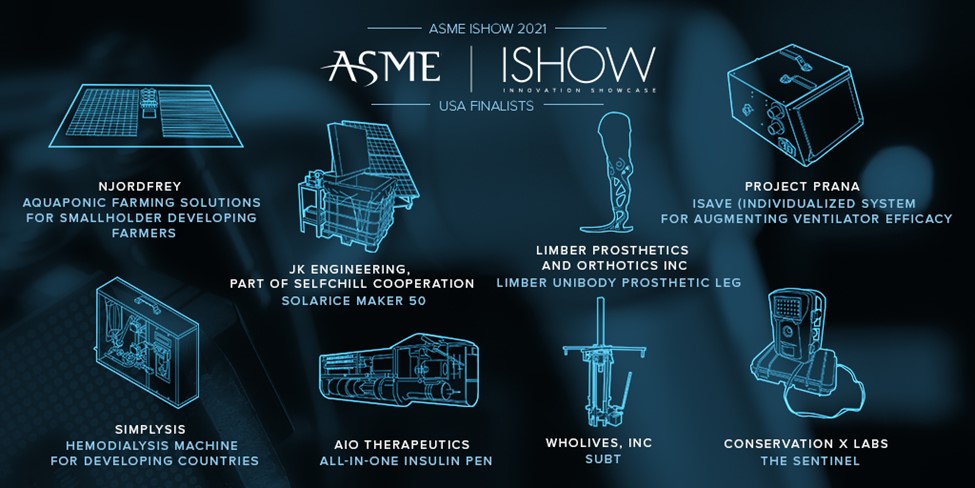Eight Entrepreneurs Selected as Regional Finalists in the Americas for Premier Social Innovation Accelerator, Held Virtually July 13-15
Eight Entrepreneurs Selected as Regional Finalists in the Americas for Premier Social Innovation Accelerator, Held Virtually July 13-15
Sustainable Agriculture, Medical Treatment, Reliable Water Supply, and Wildlife Conservation Among Causes Tackled by 2021 ASME ISHOW Regional Finalists
NEW YORK (July 7, 2021) – The American Society of Mechanical Engineers (ASME) has announced the regional finalists of the 2021 ASME Innovation Showcase (ISHOW), the premier international accelerator of hardware-led social innovation. Eight social innovators from North America, Europe, and Africa will present their design prototypes in a virtual event held July 13-15.
The ISHOW USA finalists, whose innovations address issues including sustainable agriculture, medical treatment, reliable water supply, and wildlife conservation will pitch their prototypes at noon Eastern Time on Tuesday, July 13 via web conference. Past ASME President K. Keith Roe, P.E., who is currently chair of the ASME Foundation philanthropy committee, will welcome participants to the virtual event. (Journalists on assignment to cover the event can request login information by emailing media contact below.)
The finalists will vie for a share of $30,000 in seed grants and technical support to help bring their design innovations to market. An esteemed panel of judges will privately interview each finalist as part of an extensive design and engineering review and then will choose three hardware innovations as grand prize winners. The regional finalists are:
- AIO Therapeutics (Cambridge, Mass., U.S.) for its “All-in-One Insulin Pen”—a technology that provides diabetic patients with safe and automated insulin therapy, seamlessly integrating a lancing device, glucose meter, and insulin pen with automated blood extraction, glucose measurement, insulin dose calculation, and insulin delivery
- Conservation X Labs (Washington, D.C., U.S.) for “The Sentinel”—a hardware and software platform to retrofit existing devices used in wildlife conservation, such as trail cameras and acoustic recorders, enhancing how conservationists use advanced tools, such as artificial intelligence and machine learning models, and act on important events
- JK Engineering, part of SelfChill cooperation (Stuttgart, Germany) for its “SolarIce Maker 50”—which produces 50 kg of ice blocks daily, combining solar power with innovative control and efficient operation; The product is engineered to work in tropical climates and designed to be manufactured with local material using SelfChill technology and natural refrigerant, assembled and maintained in the target countries with the help of trained staff. With a PAYG option, customers with limited finances can make monthly mobile payments for ice blocks as-a-service.
- Limber Prosthetics and Orthotics Inc. (San Diego, Calif., U.S.) for its “Limber Unibody Prosthetic Leg”—a personalized prosthesis manufactured using novel 3D printing and digital design techniques at less than one-tenth that of comparable devices
- NjordFrey (Kigali, Rwanda) for its “Aquaponic Farming Solutions for Smallholder Developing Farmers”—advanced, affordable, and sustainable fish and vegetable farming systems, education, and consulting services that help decrease levels of malnutrition in developing communities while increasing economic growth
- Project Prana (Cambridge, Mass., U.S.) for its “iSAVE (Individualized System for Augmenting Ventilator Efficacy)”—a low-cost ventilator multiplexor that repurposes existing medical flow valves to allow a single ventilator to provide personalized support to at least two patients with independent control of volume and pressure for each patient and safety measures to accommodate sudden patient deterioration and prevent cross-contamination
- Simplysis (Toronto, Ontario, Canada) for its “Hemodialysis Machine for Developing Countries”—an adaptable, user-friendly, portable, and cost-effective hemodialysis machine for use in developing countries based on locally available resources for sustainable design
- WHOlives (South Jordan, Utah, U.S.) for its “SubT” innovation—a low cost, high impact water well drilling tool that provides better access in creating clean water points, especially in rural areas of developing countries.
“We are proud to offer a forum for engineering problem-solving that truly improves lives,” said ASME Executive Director/CEO Tom Costabile. “We are continually impressed by the creative talent of ASME ISHOW participants and their passion for helping underserved communities around the world.”
ISHOW USA winners will be announced in a virtual awards ceremony on Wednesday,
July 21 at 12 p.m. Eastern Time and later shared via the ASME ISHOW website, social media, and news release. Lisa Burton O'Toole, vice president of HearstLab and 2020 recipient of the prestigious ASME Kate Gleason Award, will provide keynote remarks.
In addition, the product with the most votes in social media for each regional event will be named the “Fan Favorite’’ and will receive $1,000. Follow us on Twitter @ASMEishow for more details. The fan favorite prize is made possible and in memory of Byron G. Schieber Jr. M.S., PE, Professor Emeritus QCCNY, and Ruth L. Schieber.
ASME’s panel of judges includes successful entrepreneurs, academics, engineers, designers, investors, and industry representatives from leading organizations in India, Kenya, and the United States such as Villgro, Gearbox, Philips, Villgro Africa, and many others.
The prestigious global hardware accelerator is open to individuals and organizations taking physical products to market that will have a positive social and/or environmental impact and that improve the quality of life around the world. To date, ISHOW has enabled over 160 startups from more than 28 countries to solve critical quality-of-life challenges for people in underserved communities worldwide. ISHOW alumni have developed affordable devices to address issues including clean combustion, crop threshing, fetal health, food waste prevention, health diagnostics, safe drinking water, and many more that address the United Nations’ Sustainable Development Goals.
“Social enterprises, now more than ever, need the support of the global impact community,” says Iana Aranda, director of ASME’s Engineering Global Development sector that houses ISHOW. “Social entrepreneurs across the world, including many ISHOW ventures, are on the frontlines of the response to the COVID-19 pandemic and advancement of the U.N. Sustainable Development Goals. We are fiercely focused on providing these innovators with accessible platforms for capacity building, expert engagement and co-design of scaling strategies suited for the new normal. Ensuring their success through this global crisis is of paramount importance.”
A virtual ISHOW India was held in May and ISHOW Kenya took place in June. ASME ISHOW annually matches up to 30 carefully selected innovators with appropriate engineering experts to ensure that the proposed hardware solutions are technologically, environmentally, culturally, and financially sustainable. ASME’s panel of judges and experts includes successful entrepreneurs, academics, engineers, designers, investors, and industry representatives from leading organizations in India, Kenya, and the United States. These subject matter experts provide technical and strategic guidance based on ISHOW’s four key pillars: customer/user knowledge, hardware validation, manufacturing optimization, and implementation strategy.
ASME is grateful to The Lemelson Foundation for its continued support of the ISHOW with a three-year strategic investment and to ISHOW implementation partners around the globe. Learn more about ISHOW’s global impact in this dynamic dashboard.
Hear from ISHOW 2020 winners about their experiences. Follow the journeys of ISHOW alumni including PayGo Energy, PlenOptika, Himalayan Rocket Stove, SAYeTECH and others here.




About ASME
ASME helps the global engineering community develop solutions to real world challenges. Founded in 1880 as the American Society of Mechanical Engineers, ASME is a not-for-profit professional organization that enables collaboration, knowledge sharing and skill development across all engineering disciplines, while promoting the vital role of the engineer in society. ASME codes and standards, publications, conferences, continuing education, and professional development programs provide a foundation for advancing technical knowledge and a safer world. ASME recently formed the International Society of Interdisciplinary Engineers (ISIE) LLC, a new for-profit subsidiary to house business ventures that will bring new and innovative products, services, and technologies to the engineering community. For more information, visit www.asme.org.


 @ASMEdotorg
@ASMEdotorg
About the ASME Foundation
The ASME Foundation is the fundraising arm of the American Society of Mechanical Engineers. The Foundation supports an arc of programs addressing every stage of the engineer’s professional journey, from early inspiration and learning to career engagement and nurturing world-changing innovation. For more information, visit www.asmefoundation.org.



###
Media Contact:
Monica Shovlin
MCShovlin Communications LLC (for ASME)
monica@mcshovlin.com
+1.541.554.3796


